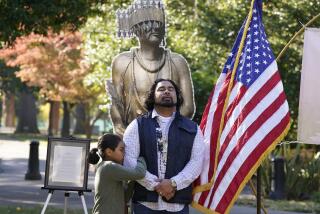White Australians’ Land Rights in Doubt
- Share via
SYDNEY, Australia — For two centuries, white Australians ignored the land rights of aborigines, whose ancestors have lived here an estimated 50,000 years.
But a recent court decision has thrown doubt on the question of property ownership, heightening racial tension and scaring investors. Miners and farmers are worried because some aboriginal extremists are seeking up to one-third of the country. Canada has similar claims by some natives in its northern lands.
In June, the nation’s top judicial body, the High Court, quashed the concept of terra nullius , which falsely contended that the continent was unoccupied by civilized inhabitants when British colonists arrived in 1788.
For generations, this legal myth justified the dispossession of aborigines at the hands of land-hungry white settlers.
In a 6-1 landmark decision, the High Court described terra nullius as the “darkest aspect of the history of this nation.” It ruled that the Miriam people of Murray Island, in the Torres Strait off northern Australia, are entitled to possession of the land where they live.
“The common law of this country would perpetuate injustice if it were to continue to embrace the enlarged notion of terra nullius and to persist in characterizing the indigenous inhabitants of the Australian colonies as people too low in the scale of social organization to be acknowledged as possessing rights and interests in land,” said one of the judges, Justice Gerard Brennan.
The decision in the Mabo case, named after the Murray Island family who launched it 10 years ago, has given Australia’s 600,000 aborigines--3.4% of the overall population--new hope for regaining some land now owned by state and national governments.
“The Mabo case gives an option for people who haven’t got land, who are still praying to the government to give us back the land,” said Northern Land Council Chairman Galarrwuy Yunupingu, who wants to set up a treaty between aborigines and whites.
However, some whites are resentful and suspicious.
“The law of property is now in a state of disarray,” warned Hugh Morgan, the chairman of one of Australia’s largest resources companies, Western Mining Corp. Ltd. He fears that outback mining projects and billions of dollars of investment are threatened.
This has been angrily rejected by the Australian government which, with several state administrations, has already returned large sections of public outback land to traditional owners as part of a push for reconciliation among blacks and whites.
“What we have here is just bigotry,” Prime Minister Paul Keating told Parliament. “It is the voice of ignorance, the voice of hysteria and the voice of the 19th Century.”
The government maintains that ordinary homeowners and business owners have nothing to worry about, while miners and farmers will not be affected dramatically.
Still, legal opinion on the decision’s possible ramifications remains confused.
Adding to white apprehension are plans by some aborigines to pursue claims on three major mining areas, including a large bauxite processing site at Gove in the Northern Territory.
More extreme aboriginal activists have called for all government-held land, about one-third of Australia, to be handed back gradually to aborigines, who would govern themselves as a nation within a nation.
More to Read
Sign up for Essential California
The most important California stories and recommendations in your inbox every morning.
You may occasionally receive promotional content from the Los Angeles Times.










